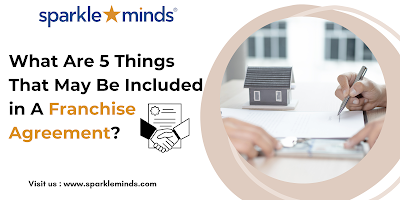For each franchise model, the exact cost of a franchise varies, although most of them have comparable startup costs. While the franchiser will assist you with some of these costs—possibly through agreements it has with preferred vendors or by loaning you the money—the burden will inevitably fall on you to raise the funds. Additionally, you will need money to operate your franchise business opportunities until it turns a profit in addition to the funds needed to create and open it.
Let's explore
some of the most common introductory franchise costs.
Franchise Fee
It's crucial to
keep in mind when starting a franchise that you are essentially
"renting" the brand from the franchise. Even though that brand has a
lot of support and recognition, being linked with it still carries a cost. The
amount fee typically varies depending on how much work is required to launch
the franchise. Franchises that
need you to choose a location, for instance, will cost more than mobile or
home-based franchises.
The cost of your
training and site selection assistance will typically be covered by your fee;
as a result, the fee is higher for franchises that need a location. Each
franchise has a different definition of what the charge includes. It may
sometimes only act as a licensing fee for the right to utilize the brand. Be
careful to precisely define what your franchise fee covers when conducting your
preliminary study.
Legal &
Accounting Fee
These fees are,
of course, your responsibility, but they are well worth it. Anyone who is
thinking about getting a franchise should speak with a lawyer who is
knowledgeable about franchise law. Your chosen lawyer will be able to go over
the franchise disclosure form and franchise
agreement with you to ensure that everything is fair.
Depending on how
much time your lawyer must spend on the documents, each lawyer will charge
differently for this. Additionally, you
should begin working with a competent accounting firm as soon as you decide to
buy a franchise. An accountant can assist you in setting up your company's
accounts and records and in calculating the amount of working capital you'll
need to launch and operate your firm until it turns a profit.
Working Capital
The amount of
money a certain business has accessible daily is known as working capital. It's
essential to have enough operating available capital to last for a specific
amount of time. It may take only a few months, or it could take a few years,
this relies on how much time it will take the company to start generating
enough money to support itself.
The amount of
working capital you'll need is often estimated by the franchiser, but you
should confirm this with your research and calculations with the help of your
accountant. Ask other franchise owners in the network how much they required or
may have invested.
Build Out Costs
The building's
construction and all associated costs, such as architectural drawings, zoning
compliance fees, contractor fees, decor, security, deposits, insurance, and
landscaping, are included in the build-out costs. They also include the cost of
all furniture, fixtures, equipment, signage, and other building-related items.
The build-out expenses, which differ significantly between franchises, will be
estimated by your franchiser.
There won't be
any buildout fees if you choose a home-based franchise, but there can be other
costs, like for vehicles.
Supplies and
Inventory
You need each of
these to manage your franchise. Restaurants require supplies including meals,
dishes, cutlery, and napkins. To provide their services, other franchises will
require different things. You can get a list or an estimate of the things you
will need to manage your franchise from your franchiser.
You will require
inventory if you buy a retail franchise or another type of business that sells
goods. Another expense that will differ greatly between franchises is this one,
but your franchiser ought to be able to provide you with estimates.
Travel Or Living
Expenses
For franchisees
and frequently the franchisee's management team, franchisers will provide
training. While the costs of travel and accommodation to attend training at a
franchise's headquarters are typically covered by the franchise, this may not
always be the case. Usually, the initial training lasts a few days to a week or
more and is then followed by additional training back at the franchisee's site.
If not,
calculate up how much the training-related fees will cost you. If travel and
accommodation are not paid for by your franchiser, you should check that they
are.
The Bottom Line
The cost of
starting a franchise is equal to the cost of starting your independent firm.
This is a crucial idea to understand if you're thinking about buying a
franchise. Nevertheless, investing in a franchise is well worth it because of
the assistance and training you receive in return. Register right away with Sparkleminds, and we'll help you
find the ideal franchise opportunity.
.png)

.png)
